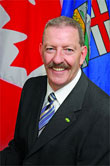
Features
Leadership
Leadership Forum: Thinking outside the box:I magine the possibilities
Many contemporary leadership textbooks contain mostly traditional suggestions about how to become a competent leader. The standard advice focuses on behaviours such as the need to develop good planning and communication skills, personal growth opportunities like the “from cop to coach approach” and learning to lead from beside, and the importance of reward and recognition programs as they relate to building morale.
April 29, 2008
By E. David Hodgins
 Many contemporary leadership textbooks contain mostly traditional suggestions about how to become a competent leader. The standard advice focuses on behaviours such as the need to develop good planning and communication skills, personal growth opportunities like the “from cop to coach approach” and learning to lead from beside, and the importance of reward and recognition programs as they relate to building morale. That’s good but my experience is that an essential component of successful leadership also involves the ability to “colour outside the lines.” That means bringing your big-picture thinking and your imagination to the table. As Albert Einstein once said, “Logic will get you from A to B, imagination will take you everywhere.”
Many contemporary leadership textbooks contain mostly traditional suggestions about how to become a competent leader. The standard advice focuses on behaviours such as the need to develop good planning and communication skills, personal growth opportunities like the “from cop to coach approach” and learning to lead from beside, and the importance of reward and recognition programs as they relate to building morale. That’s good but my experience is that an essential component of successful leadership also involves the ability to “colour outside the lines.” That means bringing your big-picture thinking and your imagination to the table. As Albert Einstein once said, “Logic will get you from A to B, imagination will take you everywhere.”
The list of accomplished Canadian leaders whose success is attributed to their superior ability to think big and imagine what could be and then actually get there is quite impressive. Individuals include beverage entrepreneur John Molson, activist and one of Alberta’s “Fabulous Five” women, Nellie McClung, First Nations chief and respected elder Dan George, the father of medicare, Tommy Douglas, and peacemaker extraordinaire, Lester B. Pearson. The key character trait that contributed to their success was their innate ability to use their imaginations.
An outstanding example of the power of one’s imagination is the acclaimed British fiction writer J.K. Rowling. Rowling is most famous for authoring the Harry Potter fantasy series, which has gained international attention and has won multiple literary awards. In February 2004, Forbes magazine estimated her fortune as US $1.4 billion, making her the first person to become a U.S.-dollar billionaire by writing books. Rowling is also the wealthiest woman in the United Kingdom, well ahead of even Queen Elizabeth II. Her tremendous success is based on her imagination and then her ability to put her imagination to good use. Now this is the application of imagination!
With respect to leadership thinking and the workplace, it’s understood that leaders and their adopted styles are often a product of their surroundings. Companies such as Microsoft know how important the work environment is in encouraging big-picture thinking and imagination. Its senior leaders go to great lengths to create an atmosphere that allows the creative juices to flow. It’s natural therefore that most aspiring emergency services leaders develop cognitive skills based on what is being modelled within their environments. They tend to copy what others are doing – the “follower” approach. Therein lies the dilemma and challenge in encouraging aspiring leaders to exploit their imagination.
In our world, the follower approach tends to dissuade one from imagining what could be beyond the artificial boundaries created by our traditions and culture. Being different is not necessarily a good thing. Here’s a personal and, I am sure, not a unique experience related to how the work culture can influence our thinking. I can remember some advice given to me more than 30 years ago as if the conversation had taken place yesterday. I was told by a senior fire officer in no uncertain terms that the road to inclusion into the “brotherhood” of firefighters was paved with stones that had been shaped by blood, sweat and tears during the past 150 years and to stray from the beaten path would not be a good thing. It was further suggested that I might even get lost while on my career journey should I choose a different path. The message, loud and clear, was that I should simply fit in and become a clone on the platoon.
This is my long-winded way of saying that if one decides to mimic the habitual thoughts and actions of immediate supervisor and if the leader is thinking and behaving in the same way as his or her boss did, then chances are imagination will not be put into play. If imagination is not part of our leadership repertoire how can we expect to create the best possible future for emergency services in the interest of life safety and the public we seek to serve? There are approximately eight fatalities every week in Canada. Imagine a world with no fire fatalities. How do we get there?
As Rowling so aptly wrote: “It is not our abilities that show what we truly are. It is our choices.” –Professor Dumbledore in Harry Potter and the Chamber of Secrets.
David Hodgins is the managing director, Alberta Emergency Management Agency. He is a former assistant deputy minister and fire commissioner for British Columbia. A 30-year veteran of the fire service, he is a graduate of the University of Alberta’s public administration program and a certified emergency and disaster manager. E-mail: David.Hodgins@gov.ab.ca
Print this page
Advertisement
- Your Call: Plenty of techniques for handling slacker issue
- Flashpoint: Is fire fighting a profession or a skilled trade?